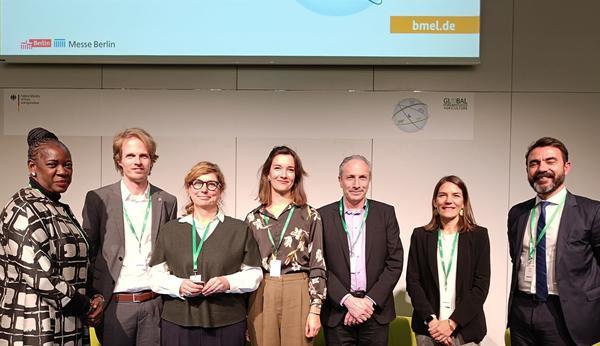ICLEI @GFFA: Cities as pioneers of change in the reduction of food loss and waste

Why are cities key actors in the fight against food loss and waste? ICLEI’s Angèle Tasse addressed this important question during a session on “Reducing food loss and waste of fruits and vegetables: The potential of urban(izing) food systems” taking place at the Global Forum for Food and Agriculture in Berlin, Germany.
“There is no silver bullet for addressing food loss and waste.” With these opening words, Lawrence Haddad, Executive Director at the Global Alliance for Improved Nutrition, made it clear: a systems approach is needed to tackle food loss and waste, which results from multiple causes and occurs at different points along the supply chain. To address such issues requires innovation and effective governance – including multi-level coordination, collaboration, and communication.
Following this compelling introduction, the panel discussion explored existing social and institutional innovations, infrastructure development and economic incentives that are deployed to reduce food loss and waste. Angèle Tasse, Senior Expert at ICLEI and CityFood Programme Co-Lead, highlighted the critical role cities play in driving food system change and offering innovative solutions to tackle food loss and waste - from making the infrastructure more efficient, to optimising public procurement, implementing fiscal incentives and developing awareness raising campaigns. Going beyond, Angèle emphasised the unique convening role of cities, who can bring together all relevant actors at the local level to discuss relevant policies and business models. Finally, she reminded the importance of local governments in piloting and testing new policies and approaches, which, if successful, can be replicated and taken on at the national level.
Building on the exciting work ahead that awaits AfriFOODlinks, Angèle also shared the project’s various entry points to tackle food waste in urban settings – including through incubation programs targeted at women and youth-led SMEs, as well as infrastructure development for urban food markets and food waste management.
Complementing the cities’ perspective, speakers from the World Vegetable Centre, GAIN and SIMAB (Sociedade Instaladora de Mercados Abastecedores) highlighted the many challenges related to inadequate market infrastructure, the resulting loss of fruits and vegetables and its impact on nutritional outcomes.
Building on these insights, the event reiterated an important yet often neglected message: cities hold great potential to act as pioneers of change in the reduction of food loss and waste – but to achieve a bigger impact, they are in critical need for stronger multi-level governance mechanisms, and for national governments to create an enabling policy environment to allow for ambitious local action.
Publishing date:


